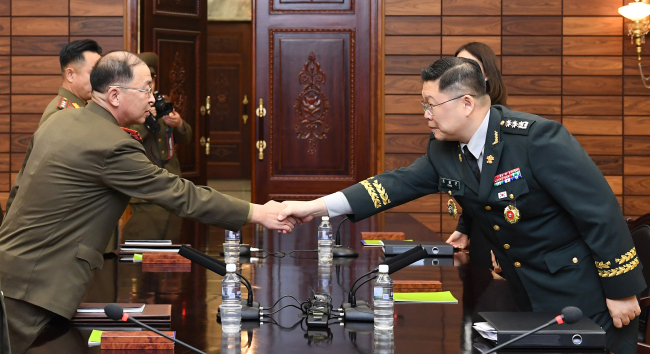 |
South Korea`s delegate chief Col. Cho Young-keun shakes hands with his North Korean counterpart Um Chang-nam during the military talks at Panmunjom on Thursday. Yonhap |
In the declaration, the two Koreas agreed to cease “all kinds of hostile acts” against each other “in every space” of land, sea and air. To prevent accidental skirmishes, two sides stopped blaring propaganda broadcast across the border and pledged to establish a “peace zone” in the West Sea.
During his meeting with an advisory panel for the Pyongyang summit on Thursday, President Moon said his trip focuses on “bringing an end” to accidental skirmishes and lingering tensions in the border region with North Korea.
The two Koreas have engaged in exchanges of fires along the heavily-fortified Demilitarized Zone and the cross-border area of the West Sea, such as the 2015 artillery exchanges in the western part of the DMZ and North Korea’s shelling of South Korea’s Yeonpyeongdo in 2010.
“What we need right now is to eliminate the possibilities of military clashes and tensions between the two Koreas,” said Moon, stressing that his top priority is reducing the risk of conflicts surrounding land and maritime borders with North Korea.
By Yeo Jun-suk (jasonyeo@heraldcorp.com)





![[Herald Interview] 'Trump will use tariffs as first line of defense for American manufacturing'](http://res.heraldm.com/phpwas/restmb_idxmake.php?idx=644&simg=/content/image/2024/11/26/20241126050017_0.jpg)
![[Health and care] Getting cancer young: Why cancer isn’t just an older person’s battle](http://res.heraldm.com/phpwas/restmb_idxmake.php?idx=644&simg=/content/image/2024/11/26/20241126050043_0.jpg)
